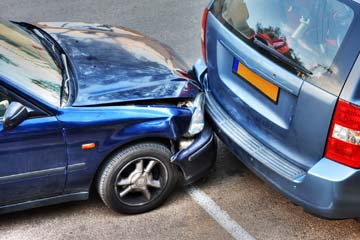John Maher: Hi, I’m John Maher. Today I’m talking with Russell Guest and Richard Allen of Guest & Brady, a personal injury law firm in Greenville, South Carolina. Today, we’re going to be talking about common car accident lawsuit questions.
Russell and Richard, welcome.
Russell Guest: Thank you, John, for having us. This is Russell here.
Richard Allen: Hey, John, this is Richard. Glad to be here.
What Is the Difference Between a Car Accident Lawsuit & a Personal Injury Claim?
John: Great. What is the difference between a car accident lawsuit and a personal injury claim? Is one better than the other?
Russell: A personal injury claim can lead to a car accident lawsuit. Anytime someone’s in an accident where there’s negligence involved, or some other party or entity is responsible for an injury, which can lead to a personal injury claim.
That doesn’t necessarily mean that we’re going to always want to pursue a lawsuit. That can follow the claim and it might mean that we do eventually file a lawsuit, but that comes in consultation between the client and the attorney to decide the proper process that we want to follow.
Most of the time, we are filing a personal injury claim with the insurance company first, then pursuing that claim to see what might be the results and what we could get from the actual insurance company. If they’re not being reasonable in their evaluation of the claim, then we might decide together to file a lawsuit.
Just because you’ve hired an attorney does not mean that you’ve filed a lawsuit, which is often times a misconception for an individual. They might come and hire an attorney and they’ll go out and speak with their friends and family, and they’ll say, “Yeah, I filed a lawsuit and I’m part of a lawsuit.”
That’s not true. It’s just simply a misunderstanding, because they’ve never gone through the process before, which is understandable. It’s a claim, and then a lawsuit.
Sometimes, though, you might decide to immediately file the lawsuit based on certain factors. One could be timing. Let’s say that you’re very close to what’s called the statute of limitations and you don’t have a choice. You need to file the lawsuit and then work through the issues that you might should have earlier as you’re going through the litigation. I would encourage you not to wait in order to speak to an attorney and prolong the time that an attorney might be able to help you.
In a claim, there are a number of things which you can do to maximize your recovery that’s important. I’m not talking about maximizing recovery in the sense of, “Let’s get all the money that we possibly can from the insurance company.” That’s not the purpose of the claim.
The purpose of the claim will result, hopefully in money, but it’s specifically to recover for damages that you’ve incurred, your loss of wages, your payment of your medical expenses that you’ve incurred, your future medicals that you might incur. These are real expenses that were caused by the negligence of another that we need to be cognizant of and be able to recover the most.
If we settle the claim or we present the lawsuit and get a verdict, we want to make sure that we’ve covered all the possibilities of future care. It could lead to anything from physical therapy appointments to future surgeries, orthotics that you might need, or just any kind of treatment.
If we settle the claim prematurely, or if an individual tries to handle that claim by themselves, they won’t be thinking about all of these and how to make sure they’ve covered this. It can be a pretty complex thing to do with the experts that you might need to hire and the questions you might need to ask from all the various professional providers.
The claims process is something that you do not want to try to handle yourself, especially if it’s more than a fender bender. You might paint yourself into a corner that makes it very difficult for any attorney to get you out of, because you’ve already made statements that are hurtful to your claim and also made certain conditions that you will not be able to recover from.
Let’s make sure that we do talk to an attorney to understand whether we’re going to file, how we’re going to pursue a claim and if we need to file a lawsuit or not.
Personal injury claims, for one thing, involve any kind of injury to a person. I had a person recently saying, “I know you do personal injury claims, but do you do on the job injuries?” We consider personal injury claims to be anything where there’s an injury to a person. Even a workers’ compensation claim is a personal injury claim to us.
We want to make sure that we are dealing with those workers’ compensation claims. Those have a different set of rules as well. Know that we also handle those types of cases.
There’s also a complexity if a case deals with whether the extent of the liability that might exist in the third party, causation as to whether the negligence of an individual actually caused the injuries. Because there can be pre‑existing conditions, and then you run into an argument with the insurance companies about whether the actual treatment that you’re receiving is caused by a pre‑existing injury or because of the negligence of the individual.
And that can be a problem in answering certain questions in the way that the insurance companies will ask you this question. So let’s make sure that we talk to a car accident attorney like ourselves before we get into that detail. And then also, what are the extent of the damages that we touched on earlier?
Those three buckets are very important — liability, causation and damages.
I want to mention one last thing, too. I had a person come and talk to me about an injury that his son was involved in.
He had received a letter from a health insurance company that his particular health insurance (he was a worker and working very hard to provide for his family) sent him a letter saying, “We understand that a family member of yours has been involved in an accident in which a third party is going to be responsible for paying. We want you to provide us with all that information.”
He was sharing that information at lunch with his buddies. They all said, “What do you mean? Why would they be worried about that? You pay your premiums. Why do you have to have that letter and why do you have to share that information with them?”
The reason is, because on almost every health insurance policy I review says that the health insurance has a right to what we call subrogation or lien against the third party proceeds for whatever the health insurance company has paid for treatment for that injury. That might not seem fair or right, but that’s been supported by the United States Supreme Court many times.
This is a contract that supposedly you’ve negotiated. We all know that as an individual employee, we haven’t negotiated that contract. It is what it is, and so you have an obligation to reimburse the health insurance company for whatever they have paid on a conditional basis.
You have to deal with it. That can have its complexities to it, as well. It can be different types of coverages that you have, whether it’s a self‑funded plan or covered by insurance. We can negotiate many of those in some instances or most instances. We know how to talk to those health care providers in order to make and minimize the amount of the lien that you have to pay back.
Make sure that you talk to a car accident attorney. You’re going to get these letters in the mail. If you don’t get the letter, it doesn’t mean that you don’t have an obligation, because you may have that obligation.
You could affect the coverages that you have by not cooperating or voluntarily telling the health insurance company that there is a third party that’s paying proceeds. You don’t want to jeopardize your coverage that you have with your health insurance company.
Lastly, there’s Medicaid and Medicare, which often times, people are covered by as well, including their family members. Medicaid and Medicare have something called a super lien, meaning they don’t have to send you any notice.
As an attorney, we have to just know that you have Medicare and Medicaid. If we know that, we have to have discovered it, then we know that we have an obligation to reimburse them and to contact them and not wait for any kind of communication from them, to tell them that we have this situation. You do, too, as an individual covered by this plans.
If you don’t, it can absolutely adverse your coverage and maybe end it for a period of time and not cover you for a period of time, so there’s certain penalties. You don’t want to get yourself caught into that scenario. Make sure that you’re talking to a car accident attorney when you’re involved in these kind of injury claims.
John: Yeah, that sounds like there are a lot of complexities involved in that.
Richard, assuming that you’ve tried to deal with a personal injury claim in terms of dealing with the insurance company and that has not gone well, or for whatever reason, you do have to file a car accident lawsuit. How long do car accident lawsuits typically take to resolve, in your experience? Is there a lot of variation in cases in terms of how long they take?
How Long Does a Car Accident Lawsuit Take to Resolve?
Richard: John, yeah, there are a lot of moving parts. I think it’s important to get a lawyer involved as quickly as possible, don’t try to handle the claim yourself. Certainly, don’t try to file the lawsuit yourself.
It’s important, from the timing aspect, because there are statutes of limitation. If you do not file within the applicable statute of limitation, then your claim is barred and there’s nothing you can do to come back and try to resurrect that claim.
It begins with filing what’s called the pleadings. That’s what you file with the court and just making the various claims and allegations. At times, the case can settle shortly after filing the pleadings and there’s a quick resolution.
If, however, the insurance company is going to want to litigate and challenge the case, then you begin with what’s called discovery, and that’s just the process where the parties exchange questions, document requests, and it’s an exchange of information.
There could be depositions as part of the discovery process. In Greenville County, in car accident cases, there’s mandatory mediation, and that’s a process where you sit down in front of a neutral party, often it’s an attorney, and you try to resolve the case. If you cannot resolve it, ultimately, you’re looking at going to trial.
Just like the complexities that are involved with filing a claim with the insurance company before filing a lawsuit, litigating a car accident lawsuit has its own complex set of rules [and] procedures. You don’t want to try to navigate those yourself. It’s important to have an experienced car accident attorney involved and representing your rights.
John: What are some of the typical lengths of time that car accident lawsuits have taken that you’ve dealt with?
Richard: It varies. Typically a year, and that would be a minimum sort of time frame that it takes to file the lawsuit, get through discovery and mediate. On average, it could take a year.
In a tractor trailer accident suit where you’re dealing with a more complex regulations, you could be dealing ‑‑ it depends on the injuries. If you have, perhaps, a death case, then those could take years to resolve, up to five years, and so it varies.
John: That’s great information. Good advice to work with an attorney, there’s just so many complexities involved in both dealing with a personal injury claim and also then potentially dealing with a car accident lawsuit. Thanks for speaking with me today, I appreciate it.
Russell: OK, thank you, John.
Richard: Thanks, John.
John: For more information about Guest & Brady, visit their website at guestbrady.com or call 800 903‑8101, or 864 233‑7200.






